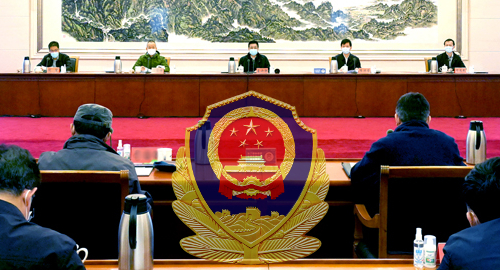 China is threatening to “severely hit” online gambling operators during the COVID-19 pandemic, while offering “heavy” financial awards to individuals who fink on operators.
China is threatening to “severely hit” online gambling operators during the COVID-19 pandemic, while offering “heavy” financial awards to individuals who fink on operators.
On Thursday, China’s Ministry of Public Security issued a six-point ‘Notice on Strictly Combating Cross-Border Gambling and Telecommunications Network Fraud During the New Crown Pneumonia Epidemic.’
The notice claims that online operators based outside the country have “increased their gambling efforts against our citizens” during the pandemic, making the harm caused “more prominent” and requiring the Ministry to take extra measures to “safeguard our economic and social order.”
The new measures are basically similar to a notice the Ministry issued six weeks ago. The previous notice called for the creation of a “‘blacklist’ system for participating in gambling and employees and overseas tourist destination,” as well as strengthening methods of detecting and cutting off online gambling payment processing.
However, one new wrinkle involves inviting citizens to “actively report and expose related illegal and criminal acts.” Should “clues” provided by Chinese citizens “play an important role in destroying the dens of the mega-crime and eliminating the gangs of the mega-crime, the public security organ will give a heavy award and protect the personal information and safety of the whistleblower.”
On the flip side, failure to report illegal gambling activity, or to provide any assistance that allows gambling operators to conceal their activity, will bring down the Ministry’s full wrath upon those whose lips remain sealed.
On Friday, the Ministry’s vice-minister Wang Xiaohong chaired a special meeting to promote the enhanced crackdown. Among the priorities of this campaign was to “speed up the construction of online reporting platforms,” suggesting that the government was planning dedicated digital finking channels through which whistleblowers could submit their tips.
GAMBLERS SUFFER THE MOST ONLINE FRAUD
Earlier this month, China UnionPay released its 2019 Internet Payment Security Survey, which claimed that the average China Mobile user made slightly more than three digital transactions per day. Slightly more than half (51%) of users said they’d ‘encountered online scams,’ a drop of 16 points from the 2018 survey, while those who’d actually suffered harm from these scams fell 26 points to 23%.
The survey added that of those users who’d suffered harm from sketchy online actors, online gamblers had the highest rate of fraud and also reported the highest proportion of ‘large losses’ to the fraudsters.
CHINA PROPOSES NEW DE-ANONYMIZED INTERNET PROTOCOL
To evade China’s great firewall, local residents often utilize virtual private networks (VPN), but China is working on a solution to this workaround. The Ministry of Industry and Information Technology, Huawei and China Unicom and China Telecom have jointly proposed replacing the internet’s existing TCP/IP protocol with something called ‘New IP.’
New IP reportedly includes a ‘killswitch’ algorithm that would allow a central part of the network to disconnect data arriving at or originating from a specific internet address. New IP would also require authorization and authentication of new internet addresses, effectively eliminating any hope of online anonymity.
China has been ramping up its efforts to destroy the concept that, on the internet, nobody knows you’re a dog. Last December, China imposed mandatory facial recognition requirements for all new mobile phone account registrations, justifying the move as a way to “protect the legitimate rights and interest of citizens in cyberspace.”
China says New IP’s development will likely be finalized the following year. Meanwhile, the International Telecommunication Union (ITU) will consider China’s proposal at a meeting this November, although many ITU members have already expressed alarm at China’s new dystopian vision of online ‘freedom.’